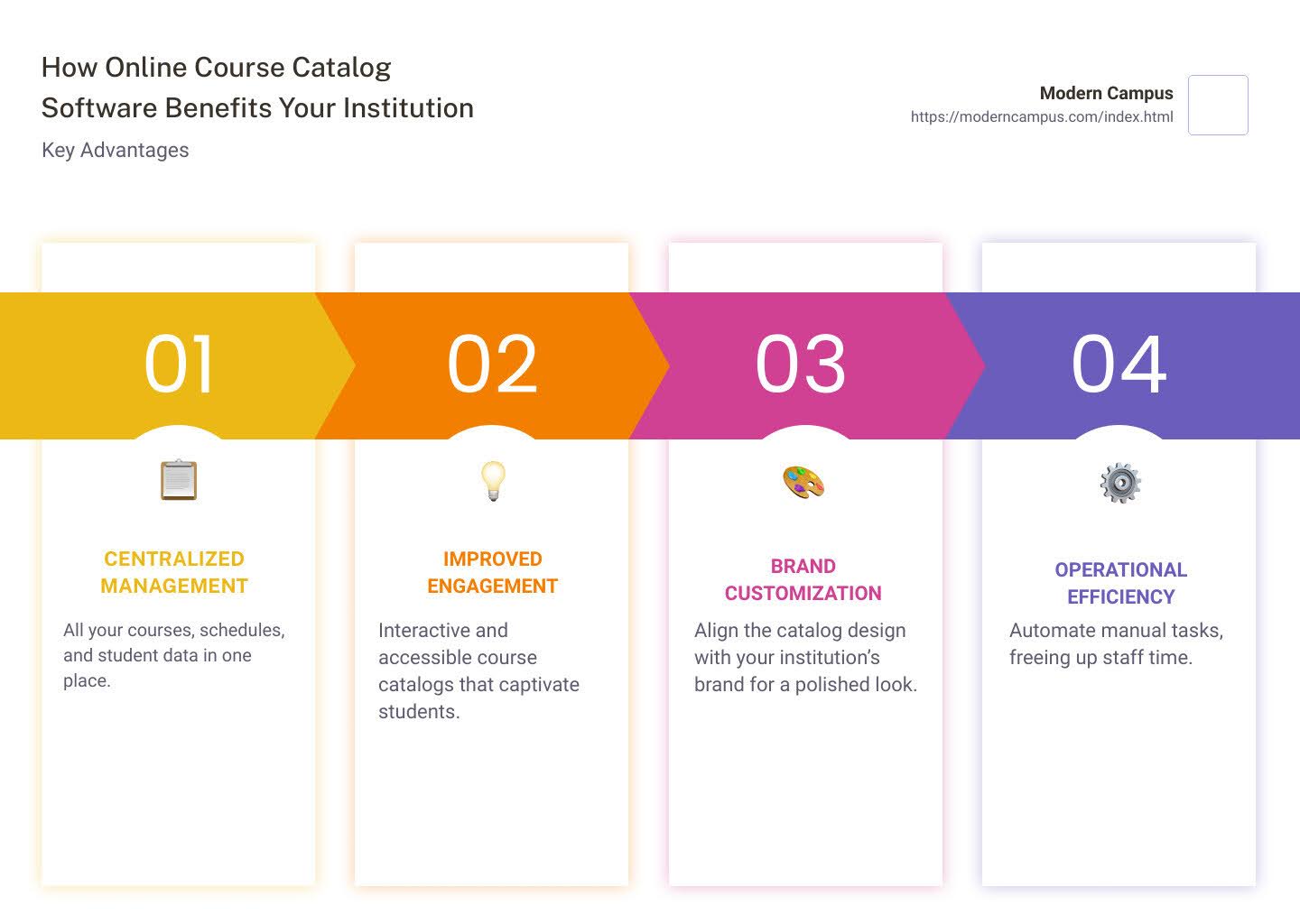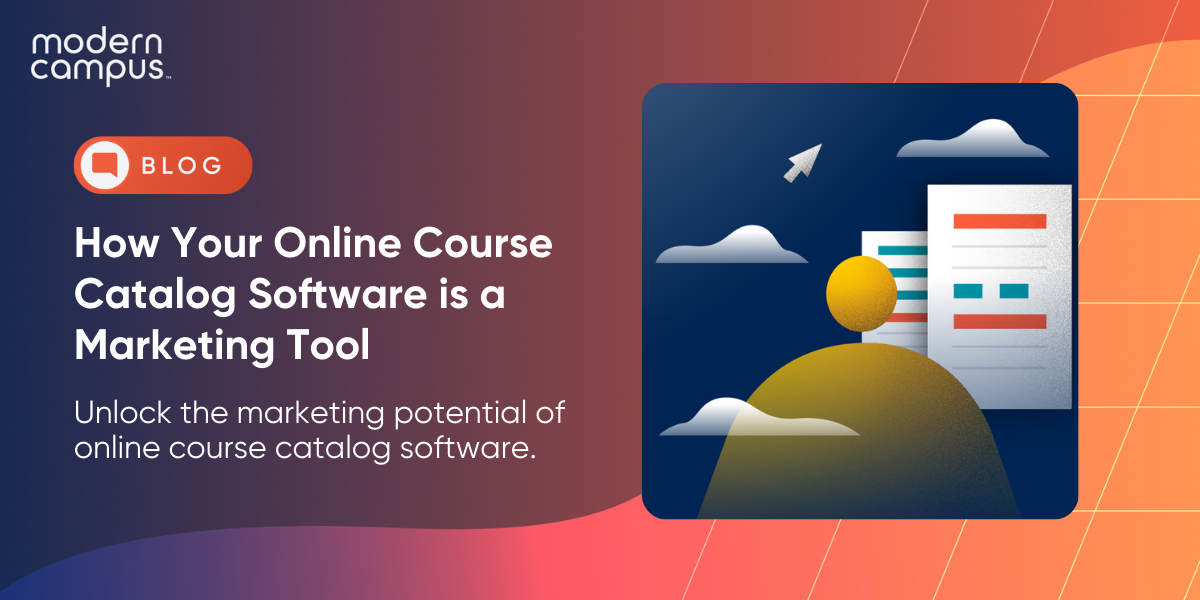How Your Online Course Catalog Software is a Marketing Tool
Higher education institutions are increasingly streamlining operations and improving student engagement by leveraging digital tools and data-driven strategies. By integrating student management systems, learning platforms and communication tools, universities can centralize administrative tasks such as enrollment, scheduling and grading to reduce inefficiencies and enable staff to focus on student support.
These systems also provide personalized learning experiences, helping educators tailor course content to individual needs and preferences. Furthermore, real-time data analytics allow institutions to track student performance and engagement. This helps offer insights that can inform timely interventions and improve retention rates. Overall, these innovations create a more seamless educational experience that boosts both operational efficiency and student satisfaction.
Online course catalog software is essential for institutions looking to streamline operations and improve student engagement. It helps schools, colleges, and universities manage courses, registration and payments in one place. This software isn't just an operational tool—it’s a powerful marketing asset too.
Boosting Higher Education Institutions Through Online Course Catalog Software
Here's how online course catalog software can boost an institution:
- Centralized Management: All courses, schedules and student data in one place.
- Improved Engagement: Interactive and accessible course catalogs that captivate students.
- Brand Customization: Align the catalog design with the institution’s brand for a polished look.
- Operational Efficiency: Automate manual tasks, freeing up staff time.

By using online course catalog software, an institution not only improves internal processes but also presents an attractive, professional appearance to prospective students. This dual role makes it an invaluable tool for any education provider.
Benefits of Online Course Catalog Software
Improved Student Engagement
Engaging students is crucial for any educational institution. Online course catalog software makes this easier with interactive catalogs that include multimedia elements like photos and videos. These elements help bring courses to life.
- Interactive Catalogs: Students can explore courses through engaging visuals and detailed descriptions.
- Multimedia Integration: Videos, images, and interactive content keep students interested.
- Intuitive Search: Powerful search tools help students find courses by campus, faculty, or topic.
Improved Accessibility
Accessibility is a must for modern educational institutions. Online course catalog software ensures compliance with federal requirements and accessibility standards like WCAG.
- WCAG Compliance: The software adheres to Web Content Accessibility Guidelines, making it accessible to all students.
- Screen Reader Compatibility: HTML capabilities allow access to screen readers, ensuring students with disabilities can steer the catalog.
- Federal Requirements: The software meets legal standards, so you can be confident in its accessibility.
Customization and Branding
A course catalog should reflect an institution's identity. Online course catalog software offers extensive customization options.
- Custom Templates: Use templates that match the institution's branding.
- Institutional Identity: Highlight unique aspects of programs, faculty and campus.
- Design Flexibility: Easily adjust the layout and fields to suit an institution's needs.
Operational Efficiency
Efficiency is key to managing an institution's daily operations. Online course catalog software automates many tasks, freeing up staff time.
- Real-Time Updates: Keep course information current with bi-directional SIS integration.
- SIS Integration: Seamlessly communicate with the Student Information System.
- Automated Workflows: Streamline processes like course approval and updates, reducing errors and saving time.
Using Course Catalog Software as a Marketing Tool
An online course catalog can serve as a powerful marketing tool by showcasing the depth and diversity of academic offerings to prospective students. With a well-organized and accessible catalog, institutions can highlight unique programs, courses and learning pathways that differentiate them from competitors. Prospective students can also explore potential career paths and educational opportunities, making the catalog a valuable resource for decision-making.
Moreover, an interactive and visually appealing catalog can enhance user experience, It provides quick access to course details, faculty information, and student testimonials, all of which contribute to building trust and attracting new applicants.
By integrating search engine optimization (SEO) strategies, the course catalog can also drive organic traffic, increasing visibility and engagement with a wider audience. Overall, an online course catalog informs students and reinforces an institution’s brand and academic reputation.
Top Features to Look for in Online Course Catalog Software
When choosing an online course catalog software, consider features that improve content accuracy, ease of sharing and student engagement.
Here are the top features to look for:
Content Accuracy and Integration
It is crucial to ensure course information is always up-to-date and accurate. This is where bi-directional SIS integration comes in.
- Bi-Directional SIS Integration: This feature allows the catalog to synchronize with the Student Information System in real time. It reduces errors and ensures data is always current.
- Error Reduction: By automating data updates, the software minimizes manual input errors, leading to more reliable information.
- Data Synchronization: Seamlessly sync course details across platforms to maintain consistency and accuracy.
PDF Generation and Sharing
Having the ability to generate and share customized PDFs on demand can be a game-changer for both compliance and marketing.
- Customized PDFs: Create custom PDFs that meet compliance standards and reflect an institution’s branding.
- On-Demand Generation: Quickly generate PDFs to provide students with the most current course information.
- Compliance Standards: Ensure that all generated documents meet regulatory requirements, making it easier to adhere to legal guidelines.
Social Media Integration
Leveraging social media for marketing can significantly boost student engagement and enrollment.
- Shareable Content: Easily share course information across social media platforms, making it accessible to a broader audience.
- Marketing Tool: Use social media integration as a powerful marketing tool to attract prospective students.
- Student Engagement: Engage students by sharing relevant course updates and information where they are most active.
By focusing on these features, an institution can position their educational offerings as modern, accessible, and student-friendly.
Choosing the right online course catalog software can be a game-changer for an institution. Here's how to make an informed decision:
Evaluation Criteria
When evaluating software, consider these key aspects:
- Accessibility: Ensure the software is WCAG-compliant and screen-reader friendly. This helps meet federal requirements and makes the catalog accessible to all students.
- Customization: Look for software that allows custom templates and branding. This ensures the catalog aligns with the institution’s identity.
- Integration Capabilities: The software should integrate seamlessly with existing systems. This reduces manual work and keeps data synchronized.
User Reviews and Case Studies
Positive feedback and real-world success stories can offer valuable insights:
- Positive Feedback: Look for reviews highlighting user satisfaction. For example, many institutions have praised their chosen software for making their administrative tasks much easier.
- Case Studies: Real-world examples can show how the software performs in different settings. For instance, some school districts have benefited from custom-designed course catalogs tailored to their specific needs.

Implementation Time and Support
A quick setup and reliable support are crucial for a smooth transition:
- Dedicated Team: Ensure the provider offers a dedicated team for installation and training. This helps staff get up to speed quickly.
- Quick Setup: A fast implementation process minimizes downtime and gets a catalog up and running sooner.
- Ongoing Support: Look for software that offers ongoing support. This ensures any issues are promptly addressed, keeping the catalog functioning smoothly.
Boost Your Marketing Strategy with Integrated Online Course Catalog Software
Online course catalog software plays a critical role in a larger marketing strategy by serving as both an informative tool for prospective students and a showcase for an institution’s unique offerings. When integrated into a well-rounded digital marketing strategy, a robust course catalog becomes a key touchpoint in the student journey. In turn this helps potential students explore educational options tailored to their interests.
It also supports SEO efforts by driving organic traffic to the website through keyword-rich content, making the catalog more discoverable in search engines. Additionally, by linking course descriptions with career outcomes, testimonials, and faculty profiles, the software enhances the institution’s brand narrative and helps build trust.
The seamless experience of navigating an interactive catalog can further engage and convert prospective students, supporting overall enrollment goals. Ultimately, online course catalog software informs and strategically promotes the institution by aligning with broader recruitment and engagement efforts.
Look for technology built exclusively for higher education. It should simplify institutional processes while delivering a modern learner experience. The provider should offer a suite of products with tools that improve student engagement and streamline operations.
Higher education is evolving. Students are re-evaluating their education needs due to factors like student debt and changing market demands. A modern catalog management platform helps institutions guide students to relevant offerings at the right time, allowing them to earn high-value credentials that align with their career goals.

Achieve Your Goals with Modern Campus
By partnering with Modern Campus, institutions can ensure they meet their strategic goals while enhancing both student and staff satisfaction. Our platform's real-time updates, seamless SIS integration and automated workflows make it easier for institutions to manage their course catalogs efficiently.
Modern Campus offers a robust and scalable solution for managing online course catalogs. Our focus on the learner-to-earner lifecycle ensures that students receive a high-quality education that prepares them for successful careers. With our proven track record and comprehensive suite of tools, Modern Campus is the ideal choice for any institution looking to innovate and thrive in today's educational landscape.
Last updated: November 7, 2024

